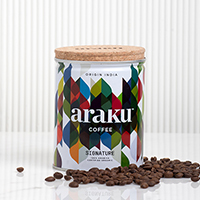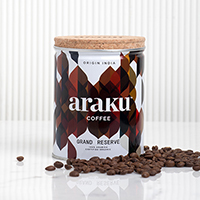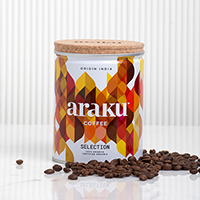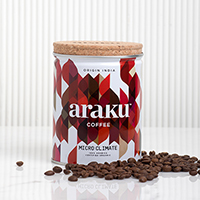GET 20% OFF
By subscribing to our newsletter
How to grow plants with leftover coffee grounds
Usually, after brewing a cup of coffee, most of us toss away the remaining grounds. But as it turns out, there is a way to make use of these coffee grounds after all! Coffee grounds are rich in nitrogen and have good amounts of calcium, magnesium, and other important micronutrients. All of these nutrients can help maintain the healthy growth of plants. This gives us one more reason to drink coffee, right? Our excuse to now make another cuppa is, “I am brewing coffee to help my plants grow!”
However, anyone that has indoor plants or an outdoor garden knows that gardening is not that easy. Depending on the kinds of plants you’re growing, the soil chemistry needs to be just right. And coffee grounds, when used with care, can give any garden a much-needed boost. They’re not only an excellent source of good nutrients but they’re also an organic addition to the soil. This helps houseplants thrive under good care.
Why and how to use coffee grounds?
Making use of coffee grounds is good for plant growth and is also a way to recycle a valuable farming ingredient––it helps both economically and environmentally. At Araku, we follow organic protocols in each step while growing our Speciality coffee. Every cup of coffee made from Araku coffee beans is part of ethical and sustainable farming. It’s only fair to take this mission forward, right?
On our quest for sustainable gardening, coffee grounds play a major role.
Let’s start with a few ways of using the leftover grounds. There are lots of methods people around the world use but two of our recommended ones are: composting and sprinkling. Both of these methods add the right ingredients, improve drainage, water retention, and aeration in the soil.
The benefits of using these methods are immense but as always, do let your plants guide you. Try these methods and tweak according to the garden you have.
Composting
In order to use coffee as a plant fertilizer, it is best diluted in a compost system. A compost must have the right amounts of two types of material: brown and green. Even though your coffee looks brown, in compost jargon, they’re actually ‘green’ ––which is for items rich in nitrogen. Other green compost materials include food scraps and grass clippings. You can also add your coffee filters, preferably unbleached, into the compost bin.
Make sure that the addition of coffee grounds, as green compost, is balanced with brown compost material, such as dry leaves and newspapers. When using coffee grounds, the ratio of your brown to green compost material should be approximately 4:1. An ingredient that works well with coffee grounds is microbe-rich yard waste. We recommend adding four parts of shredded leaves to one part of coffee grounds for the perfect garden compost.
Sprinkling
If composting is not an option for you, then this is the next best method to make use of coffee grounds. All you have to do is mix one part of coffee grounds to five parts of soil for your plants. When you dilute the coffee grounds this way, you can use them as mulch.
As mulch, make sure to use this mixture in a thin layer. If the layer is too thick, the coffee grounds can form a solid crust which can stop the flow of air and water to the soil underneath. No more than an inch of the soil mixture should do the trick. Using coffee grounds as mulch is a much cheaper and eco-friendly alternative to wood chips. Despite fresh coffee grounds being quite acidic, coffee remnants have a nearly neutral pH and therefore will not negatively affect the soil.
Coffee grounds are, in a way, free organic matter––either they’re leftovers of your daily brew or collected from your local coffee shop. It is important to use them carefully in your soil and not overdo the ratio. Other than adding diluted coffee grounds to the soil, make sure to water it right, and ultimately balance the soil’s chemistry.
If you have excess coffee grounds, you can store them temporarily in containers. Or if you would prefer to store them long-term, you can dry them out in the sun first and then store them away. This way, you can use them later on or even share them with friends who have house plants or gardens!
If you would like to order organic coffee to brew now and later on help your plants flourish, you can check out our coffee bean variants here. At Araku, each bean is sustainably-grown and roasted in-house so you’ll always experience delicious & healthy coffee!



